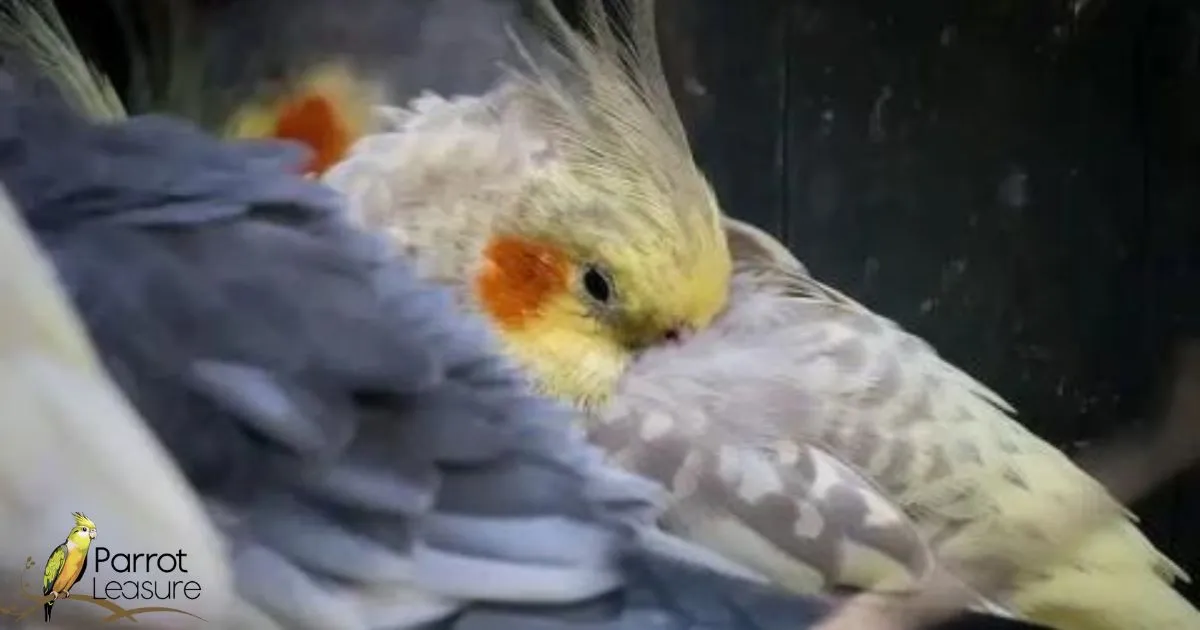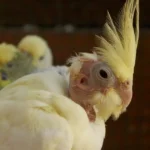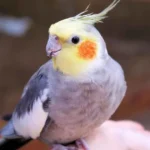One of the quirks of these popular pet birds is their sleeping behavior. Just like us, cockatiels sleep at night. This species frequently makes use of a roosting position by sitting up high in its cage and nestling its head into its body, even covering half of its face with a wing. Cockatiels simply sleep, and stay quiet by puffing up their feathers to keep themselves warm.
Ever thought about your bird’s sleeping habits? Cockatiel Bird Sleep Patterns Is your bird healthy and happy? Curious to learn more? The Truth About How Do Cockatiels Sleep By doing so you reveal the secret to help your pet bird go to sleep and be calm.
Your cute cockatiel friend should spend around 10-12 hours a few times at night. They like to get peaceful and darkly asleep During the day some cockatiels may even take short naps, this is often a sign that they feel safe and comfortable. Giving your cockatiel a good night’s sleep is very important and will help prevent stress-related behavior.
Understanding Cockatiel Sleep Patterns
There are some things you need to know about cockatiel sleep in general; that way you can differentiate if any of Your individual birds’ sleeping habits are unhealthy. Similar to humans, they sleep at night. These birds like to nest in the highest places in their cage. Cockatiels Sleeping With Their Heads Under Wings
What We Covered: Sleep patterns differ depending on the age and environment of your cockatiel. Cockatiels may sleep more young and older up to 12-14 hours daily. The average adult cockatiel sleeps at night for 10 to 12 hours. They will also take quick naps throughout the day, especially in a quiet area.
The Ideal Cockatiel Sleeping Environment
The sleeping place for your cockatiel should be cool and dark. Draw the blind or cage cover, to obscure vision and minimize disturbance. Offer a nice high perch in preference to the highest point available in the cage.
The optimal sleep room temperature is between 65-80°F (18-27°C). Do not use it in a draft or near an air conditioning vent. Take down any mirrors, or anything shiny that could cast a reflection. Remove toys that will block the natural light throughout the room.
Keep a night light nearby if your cockatiel is bothered by total darkness. Keep your bird in peace and not awaken it unless necessary, as being awake when feeling sick and without sleep can help worsen its condition.
Cockatiel Sleep Positions: What They Mean

Cockatiels have various sleep positions that indicate their comfort and health. The most common position is perching with one foot tucked up and the head turned back, resting on the shoulder. Some cockatiels sleep hanging upside down, which is normal and shows they feel secure. Others may sleep with both feet on the perch and their head tucked under a wing.
Sleeping on the cage floor can signal illness or discomfort and warrants attention. A cockatiel sleeping with eyes half-open might be on alert due to perceived threats. Puffed-up feathers during sleep help regulate body temperature. Understanding these positions helps owners gauge their pet’s well-being and adjust their environment accordingly.
Nighttime Routines for Your Cockatiel
Establishing a consistent nighttime routine is crucial for your cockatiel’s well-being. Start by dimming the lights in their environment about an hour before bedtime. Remove any toys or mirrors that might stimulate them. Offer a final snack and fresh water to ensure they’re comfortable through the night.
Cover your cockatiel’s cage with a breathable cloth to create a dark, quiet space. This mimics their natural habitat and signals it’s time to sleep. Ensure the room temperature is stable, ideally between 65-75°F (18-24°C). Maintain a quiet environment to prevent disturbances that might startle your bird during the night.
Cockatiel Napping Habits During the Day
Cockatiels often take short naps during daylight hours. These naps typically last 10-30 minutes when the bird feels safe and relaxed. Daytime napping is normal behavior for cockatiels and helps them recharge. They may nap more frequently if their environment is calm and comfortable.
Cockatiel naps are usually light, alerting them to potential threats. During these naps, you might notice your cockatiel perching with one foot tucked up. They may also ruffle their feathers slightly or tuck their head partway under a wing. It’s important not to disturb a napping cockatiel unless necessary.
How Do Cockatiels Sleep
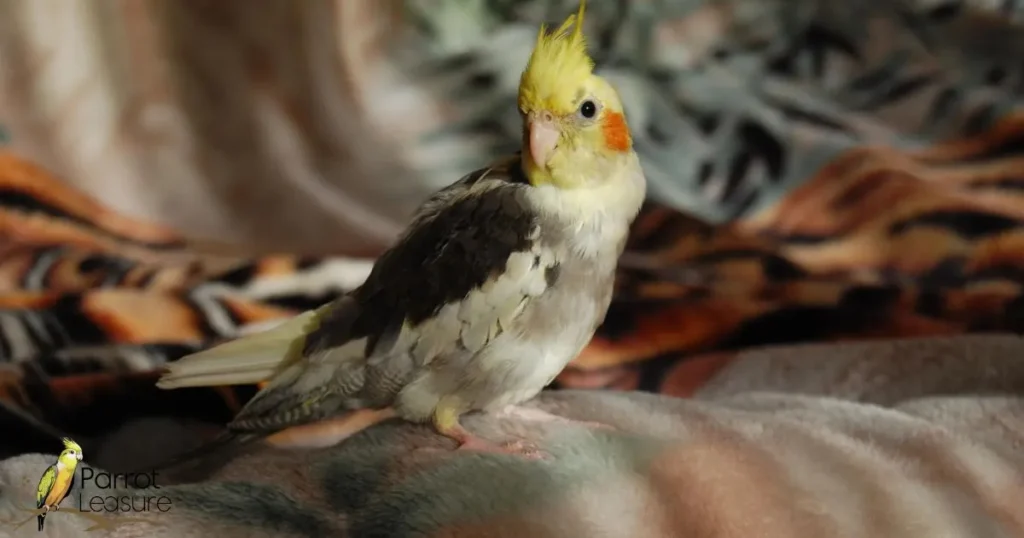
How do cockatiels sleep? Cockatiels sleep by perching on a high spot in their cage, often with one foot tucked up. They tuck their head under a wing and puff out their feathers for warmth. Cockatiels typically sleep at night for 10-12 hours, mirroring human sleep patterns. They prefer a quiet, dark environment for optimal rest.
Some cockatiels may take short naps during the day, especially if they feel safe. Understanding how cockatiels sleep is crucial for their health and behavior. Signs of a well-rested cockatiel include alertness, good appetite, and playful behavior. Disrupted sleep can lead to stress and health issues in these birds, so providing proper sleeping conditions is essential.
You May Also Like: How long do Cockatiels live in captivity?
Signs of a Well-Rested Cockatiel
A well-rested cockatiel displays clear signs of contentment and energy. Their feathers appear smooth and well-groomed, not ruffled or messy. Their eyes are bright and alert, showing interest in their surroundings. Well-rested cockatiels are typically active, engaging in play and vocalizations throughout the day.
These birds maintain a consistent eating pattern when properly rested. They show a good balance on their perch and move around their cage with ease. A rested cockatiel is also more responsive to interaction and may seek out attention from their owners. Their overall demeanor is calm and relaxed, without signs of irritability or stress.
Common Sleep Disturbances in Cockatiels
Cockatiels may experience various sleep disturbances. Noise, bright lights, and changes in routine can disrupt their rest. Illness, stress, or discomfort in their cage can also affect sleep quality. Some cockatiels may suffer from night frights, causing them to panic and flap around their cage at night.
Overcrowding in the cage can lead to sleep issues for cockatiels. Drafts or temperature fluctuations may disturb their sleep patterns. Hormonal changes during the breeding season can also affect sleep. Nightmares, though rare, can occur in cockatiels, causing them to wake suddenly or vocalize during sleep.
Cockatiel Sleep Duration: How Much is Enough?
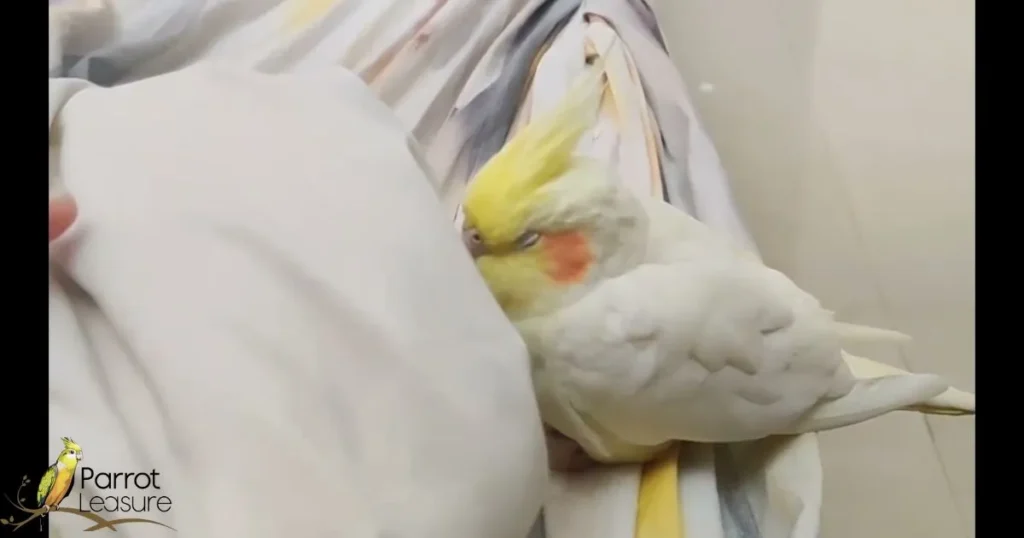
Cockatiels typically need 10 to 12 hours of sleep each night. This sleep duration is crucial for their health and well-being. Young cockatiels and breeding pairs may require even more rest. Consistent sleep patterns help maintain their energy levels and mood.
Insufficient sleep can lead to stress and behavioral issues in cockatiels. Signs of sleep deprivation include irritability, decreased activity, and feather plucking. To ensure adequate sleep, maintain a regular schedule for your cockatiel. Provide a quiet, dark environment during their sleeping hours.
Seasonal Changes in Cockatiel Sleep Behavior
Cockatiels may adjust their sleep patterns with changing seasons. In winter, they often sleep longer due to shorter daylight hours. Summer brings longer days, potentially causing cockatiels to stay awake later. Some cockatiels become more active during breeding seasons, affecting their sleep routines.
Temperature fluctuations can also impact cockatiel sleep behavior. In colder months, they might puff up more to stay warm while sleeping. During hot seasons, cockatiels may seek cooler spots for rest. Providing consistent light cycles and temperature control helps maintain stable sleep patterns year-round.
Improving Your Cockatiel’s Sleep Quality
To improve your cockatiel’s sleep quality, create a consistent bedtime routine. Cover the cage with a breathable cloth to block out light and noise. Ensure the room temperature is comfortable, ideally between 65-75°F (18-24°C). Provide a variety of perches at different heights to let your bird choose its preferred sleeping spot.
Reduce stress by minimizing disruptions during sleep hours. Offer a balanced diet and plenty of exercise during the day to promote better sleep at night. Consider using a night light to prevent night frights. Regularly clean the cage and replace bedding to maintain a hygienic sleeping environment for your cockatiel.
When to Consult a Vet About Cockatiel Sleep Issues
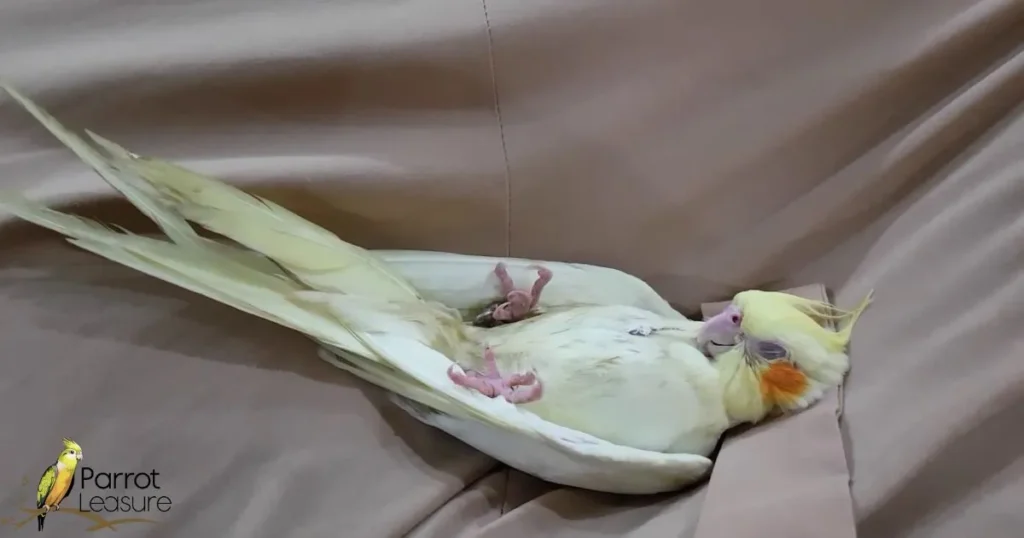
Cockatiel sleep issues can indicate health problems. Watch for changes in sleep patterns or positions. Excessive daytime sleepiness or difficulty sleeping at night are red flags. Unusual noises or movements during sleep should also raise concern.
Consult a vet if your cockatiel seems lethargic or irritable due to poor sleep. Sudden changes in sleep location or refusal to sleep on perches are worrisome. Seek professional help if sleep issues persist for more than a few days. Early intervention can prevent serious health complications in your feathered friend.
FAQ’s
How many hours does a cockatiel sleep?
Cockatiels require about 12-14 hours of darkness and sleep per night to maintain optimal health and well-being.
Should cockatiels be covered at night?
It is not necessary to cover bird cages at night. Sometimes a bird prefers it, sometimes it is needed to limit daylight when you have a bird who won’t stop laying eggs.
What toys do cockatiels like?
My cockatiels like chewing on natural branches, grass mats, and small pieces of vegetable-tanned leather.
What do cockatiels love?
Cockatiels enjoy a range of foods, including commercial birdseed, pelleted food, vegetables, fruit, and the occasional treat. A mixture of 75% pellets and 25% seeds will be the mainstay of your cockatiel’s diet.
Can cockatiels see in the dark?
A cockatiel can see very little in the dark and, while in this state, is likely to do itself much damage. This phenomenon can also cause distress to other birds, such as finches or budgerigars.
Final Thoughts
Cockatiels have unique sleep habits that are crucial to their health. Understanding these patterns helps you provide better care for your feathered friend. By creating the right environment and routines, you can ensure your cockatiel gets the restful sleep it needs to thrive.
